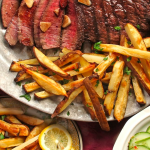It is a common notion that people on the carnivore diet are usually constipated. This is far from the truth. Most people on a carnivore diet do not suffer from constipation, and only a low proportion of carnivore dieters have irregular bowel habits.
Here we explain the myth behind fiber and why it actually causes constipation rather than fixes it. Plus, we go into detail about why you might be suffering from constipation at the start of your diet, with some tips to avoid this carnivore diet side effect completely.
TABLE OF CONTENTS
Debunking the Fiber Myth
First, let’s debunk a myth about fiber and constipation. It is a widely held belief that the carnivore diet does not contain fiber, which is needed for a regular poop schedule, so eating only meat will make you constipated.
Fiber increases the weight and size of your poop and makes it softer. A bigger stool is supposedly easier to pass, so fiber is thought to decrease your chance of constipation.
However, Fiber is present in vegetables and fruits in two forms; soluble and insoluble. Gut bacteria ferment insoluble fibers. As a result, gases are produced and irritate the gut lining resulting in bloating and cramping.
Research conducted by Kok-Sun Ho and associates in 2012 showed that fiber was, in fact, the cause of constipation, not the solution to it. Other studies published in the world journal of gastroenterology also showed similar results.
In short, a low-fiber carnivore diet will not cause constipation.
What Causes Constipation on the Carnivore Diet?

So if fiber is unrelated to constipation, then what can be the cause of constipation in carnivore dieters?
There are some of the potential causes:
- Our gut is adapted to the food that we usually eat. This is why we suffer from unpredictable bowel habits when changing our diet. The same is true for people shifting to a carnivore diet. Their gut takes time to adapt to the new variety of high-protein food. As a result, they may get constipation, diarrhea, or both in alternation.
- The gut is home to billions of bacteria. These bacteria are helpful to us in various ways. The type of food we generally eat affects the bacteria population too. When we switch to a high protein diet from a high carb diet, the bacteria population also gets altered, which may be the leading cause of constipation.
- As more protein is consumed, more stomach acid is needed to break it down. As this may take time, diarrhea or constipation can result at first.
- Bile is needed in the breakdown and absorption of fat. Constipation may ensue from a switch to low fat to a high-fat diet
The high protein content of the carnivore diet can be the most critical reason for constipation. The body has a limited ability to reabsorb amino acids. Excess proteins overload the system with amino acids, and unabsorbed amino acids are the prime cause of the alteration of bowel habits.
How to get rid of Constipation on a Carnivore Diet
Dehydration and deficiency in nutrients like vitamins D and A can worsen constipation. Inflammatory foods and tap water can also cause constipation.
Therefore, constipation on a carnivore diet can easily be avoided by following a few simple steps.
- Drink plenty of water. Bone broth on the carnivore diet can help with hydration and electrolyte intake.
- Avoid inflammatory food such as eggs and dairy products, which cause issues for many people
- Take probiotics and short-chain fatty acids to help with gut health
- Take bile and HCl (Hydrochloric acid) supplements to help digestion
- Do adequate exercise and increase your walking time to also improve bowel habits
The most important is maintaining adequate fluid levels and minerals in the body. Our stools get harder and less frequent if we don’t take much water.









Leave a Reply